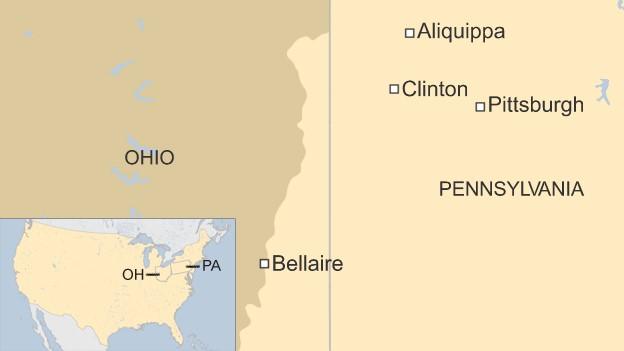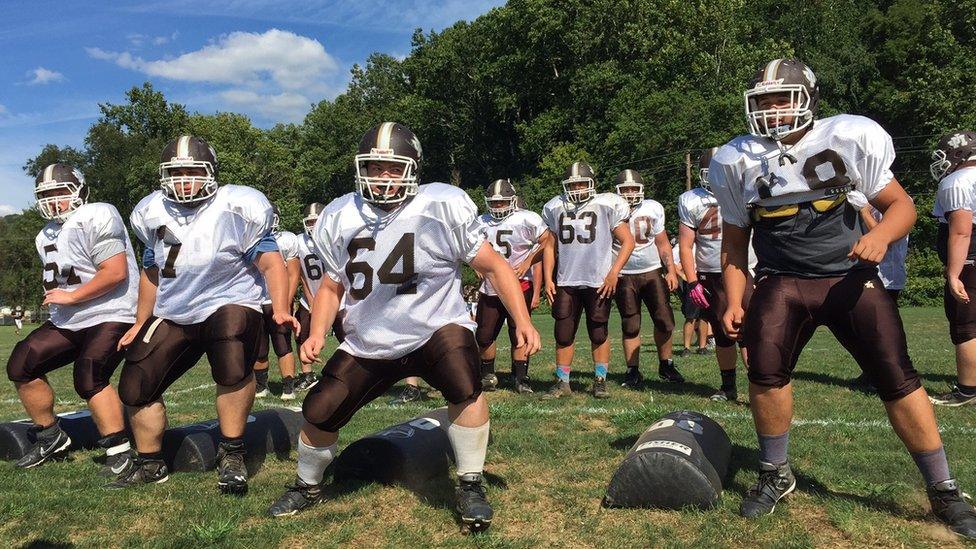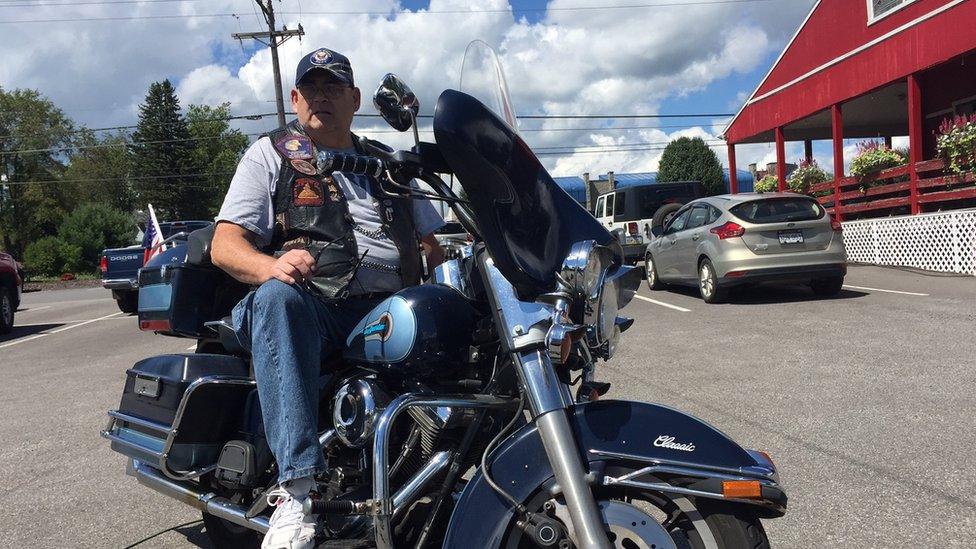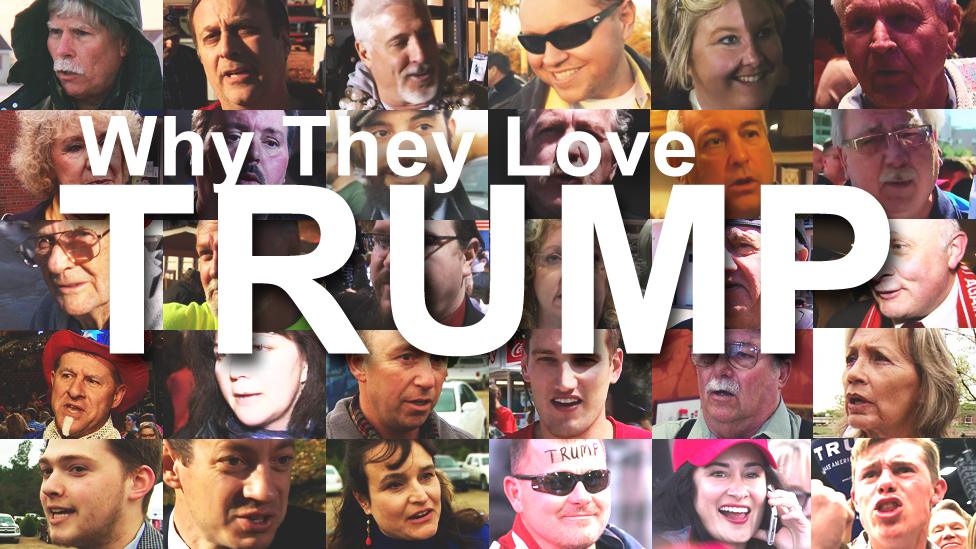The states Trump can't afford to lose
- Published
Nick Bryant reports: "No Republican has ever become president without winning Ohio"
This election could be decided on the banks of the Ohio River.
It meanders through two of the most hotly contested battleground states, both prime targets for Donald Trump and Hillary Clinton.
Ohio, the classic bellwether, has picked the winner in every presidential election since 1960. Pennsylvania has voted Democrat in the past six contests, but Donald Trump has designs on turning this reliably blue state Republican red.
The town of Bellaire in Ohio provides precisely the sort of post-industrial landscape that's been a seedbed for his candidacy. Four steel mills have shut down in this area over the decade and derelict plants serve almost as echo chambers for the slogan Make America Great Again.
The small stretch of river that runs alongside the town used to bustle with 300 barges, which ploughed through the waters 24 hours a day.
Now it's a third of that number, and not such a round-the-clock operation. Captain Bob Harrison, who runs a local tug boat company, believes the billionaire will revive the local economy.
"He's a businessman," he says.
"That's what we need to get things going again because politicians are doing nothing for us and we've been overregulated. The trade deals have all failed. It seems like nothing's worked."
Bellaire, despite the shuttered shops and hardscrabble feel, still proudly refers to itself as the all-American town - a place that's representative, a bellwether within a bellwether.

Stops on Nick Bryant's trip through Ohio river towns
Last time people here voted for the Republican presidential candidate, Mitt Romney.
In the election before. Bellaire went for Barack Obama.
If Trump can't win here, he will struggle to become president. And although there's no shortage of white working-class supporters ready and eager to vote for him, there are Republicans here who are refusing to back him.
Getting out the vote is called the ground game, a term borrowed from American football.
But one of the local football coaches, Bill Timko, is refusing to back Trump. He had planned to vote Republican at this election.
In the primaries, he liked the look of Jeb Bush, Marco Rubio and Ted Cruz. But Trump, he reckons, does not have presidential qualities.
"He's doesn't have any tact," he says. "If you are going to deal with world leaders you have to have tact. You can't sit there and say it's my way or the highway. He's bombastic, he's obscene, and I don't like the guy."
His list of complaints does not end there.

"The country is more than running a business. There's all kinds of things to be taken care of and I don't think he has the ability to do that.
"Every time he hires good people, if they don't agree with him, he fires them. So, I mean you look at his campaign managers, they're all gone. He got rid of all of them. So I'm not buying that theory."
Amber Thompson is another Republican who is refusing to support Donald Trump. At the last election, she actively campaigned for Mitt Romney. Her husband is a Republican who has run for office. But she cannot stomach the thought of Donald Trump as the party's standard-bearer.
"I think he has a real problem with women who aren't supermodels," she says. "He doesn't like Muslims. He doesn't like immigrants. He has no respect for the military. I would never support somebody like that."
Are you going to sit this election out? I ask.
"No," she says. "I'll be voting for Hillary Clinton."
Compounding his problems, Trump has an uneasy relationship with Ohio's state Republican party. Governor John Kasich, his rival during the Republican primary campaign, is refusing to back him. And no Republican has ever reached the White House without winning Ohio.

Ron Zanski plans to vote for Trump "I think he means what he says and he speaks for a lot of people."
As we travelled into Pennsylvania, we got a clearer sense of Hillary Clinton's vulnerabilities. Take the community of Clinton, Pennsylvania, where a giant sign reading "Vote Trump" greets drivers.
What makes the sign all the more meaningful is that it was erected by a long-time Democrat, Mike Leber. Eight years ago, in the Democratic primary fight between Barack Obama and Hillary Clinton, he voted for Clinton.
Now he drives around in a pick-up truck with another large sign reading "Crooked Hillary" in the back.
Two-thirds of voters have told pollsters they don't trust the former Secretary of State.
"She hasn't spoken a truthful word in thirty years," Mike tells me. "If the dogcatcher was running against Hillary Clinton, I'd vote for the dogcatcher."
As we were talking to Mike, Ron Zanski pulled up on his Harley Davidson. He lost his job at a fuel plant earlier in the year, and blames foreign competition and poorly negotiated trade deals. Donald Trump speaks his language.
"I think he's sincere," says Ron. "I think he means what he says and he speaks for a lot of people."
What about Hillary Clinton? I ask.
"She should be in prison."

More from the BBC

Republican Donald Trump is a candidate and presidential nominee like no other. So what is it that his supporters like so much about him?
Over the last 12 months, his supporters have been telling the BBC why they are so attracted to him and his message.

If Donald Trump wins this state, along with its 20 Electoral College votes, it opens up a path to the White House.
For the Democrats, Pennsylvania is one of the key bricks in the so-called blue wall, the 18 states that have voted for Democratic presidential candidates in the past six presidential elections, and which gives them an advantage in the Electoral College.
Further along the Ohio river, we came to Aliquippa, another faded steel town, where Hillary Clinton is vulnerable.
But she is helped by the fact that more a third of voters here are African-American.
It's a constituency that Donald Trump has recently tried to court, partly to boost his standing with sceptical minority voters and partly, it seems, to persuade white voters that he's not racist.
US Election: Voters in Pennsylvania sound off
So would African-Americans like Jerome Raines support him?
"Absolutely no! No! No! No! If I've seen a black guy voting for Trump, I'll have to do like this and rub his skin and make sure," he says, playfully rubbing at my arm.
"We don't want an idiot in the White House and we definitely don't want a racist in the White House."
Not since the 1940s have the Democrats won three presidential elections in a row.
The country's modern-day demographics, and the fact that the US is even more a polyglot nation, seem to work in their favour.
But questions of trust and ethics bedevil Hillary Clinton, and that's partly why Donald Trump is still in the game.